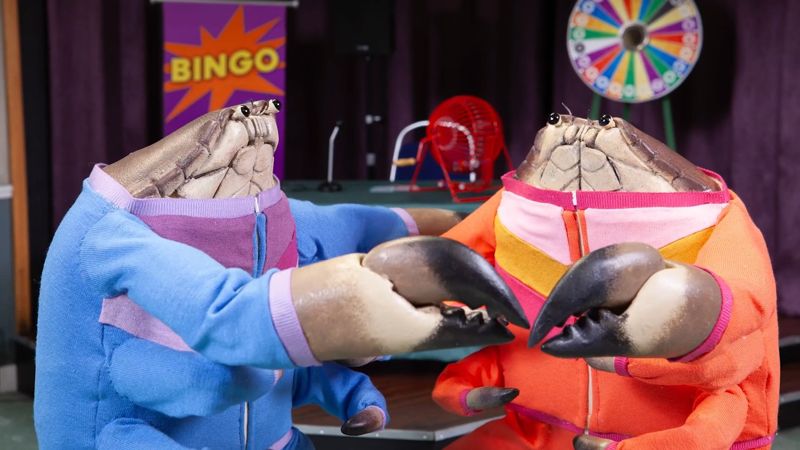How to get banned and save the planet
When a spot exposing how Big Oil companies use influencers for greenwashing was banned on LinkedIn, the makers swiftly fashioned a smart response that was even more effective. shots spoke to the team behind the campaign – creatives Lara Baxter and Alice Goodrich– and James Turner, founder of creative collective Glimpse, about the making of Save the Planet, Unfollow a Greenwasher.
How did you come up with the concept for the original spot and the post-ban second iteration?
Glimpse had an open call inviting people to work on a brief as part of its Inside Job initiative, which is an ongoing drive to get young creatives to change advertising for the better, from the inside out - encouraging them to reject high carbon clients.
The task was refreshingly simple and compelling: make people aware that oil and gas companies are using influencers to make their businesses look green.
We know that climate change messaging can easily become worthy, so we wanted to get our point across in an entertaining way.
We decided that a film would be the best way to tell the story. That’s where 'Sally' was born, the greenwashed influencer working with Big Oil. Creating a character meant we could dramatise the problem and create a shareable piece of content that felt right for social.
We know that climate change messaging can easily become worthy, so we wanted to get our point across in an entertaining way – that’s where the ‘Oily Mouth’ concept came from.
We worked with directors Carys and Thor to bring the film to life, they were amazing throughout the whole process – they had really thought through every detail when it came to making Sally look like a believable influencer.
We re-edited the film the same day it was banned, covering up the ‘vomit’ with Shell’s greenwashed claims.
The LinkedIn ban came out of nowhere. We’d tried to push out the film as a paid promotion but the platform banned it, stating the (fake) vomit was “offensive to good taste”.
We leapt on it as an opportunity to push the message even further. We re-edited the film the same day it was banned, covering up the ‘vomit’ with Shell’s greenwashed claims. For us, these campaigns are never done when you launch them, it’s all about how you can keep building on it and responding to anything that happens.
Credits
powered by
- Agency Client Direct
-
- Director Carys Thomas
-
-
Unlock full credits and more with a Source + shots membership.
Credits
powered by
- Agency Client Direct
- Director Carys Thomas
- Editorial Final Cut/London
- Editor Leah Burton
- Post Production Untold Studios
- Audio 750mph
- Sound Designer Ellis McGourlay
- Creative Lara Baxter
- Creative Nikki Lindman
- Director Thorbjorn Kragh Liljegren
- Producer Paris Starr
- Producer Georgia Day
- DP Daniel Boulton
- Editor Producer Ella Marafini
- Producer Nathan Hoad
- Colorist Malin Imerslund
- Sound Recordist Matt Valentine
- Producer Olivia Ray
- Creative Alice Goodrich
- Producer Cassy Bhairo-Wright

Credits
powered by
- Agency Client Direct
- Director Carys Thomas
- Editorial Final Cut/London
- Editor Leah Burton
- Post Production Untold Studios
- Audio 750mph
- Sound Designer Ellis McGourlay
- Creative Lara Baxter
- Creative Nikki Lindman
- Director Thorbjorn Kragh Liljegren
- Producer Paris Starr
- Producer Georgia Day
- DP Daniel Boulton
- Editor Producer Ella Marafini
- Producer Nathan Hoad
- Colorist Malin Imerslund
- Sound Recordist Matt Valentine
- Producer Olivia Ray
- Creative Alice Goodrich
- Producer Cassy Bhairo-Wright
What reaction have both spots garnered on social channels and in the media in general?
We’re really happy with how the spots have done on social media, both videos were widely shared and there were lots of positive responses in the comments. In terms of wider PR, once the response video came out things blew up a bit.
Ad agencies are the ones who work with these influencers, and on oil and gas clients in general, so we’re happy that they heard the messaging loud and clear.
The films were featured widely in adland in the UK, US and even in France and Germany, too. Ad agencies are the ones who work with these influencers, and on oil and gas clients in general, so we’re happy that they heard the messaging loud and clear – hopefully it makes them think twice about taking on those briefs.
On a day-to-day level, people tend to respond to humour and entertainment instead of rationality and facts.
Ideally, Sally would have reached the wider world too, as consumers are the ones faced with these smiling influencers on their feeds. We had interest from some big publications and newspapers, but ultimately those chats never led anywhere.
Credits
powered by
- Agency Client Direct
-
- Director Carys Thomas
-
-
Unlock full credits and more with a Source + shots membership.
Credits
powered by
- Agency Client Direct
- Director Carys Thomas
- Editorial Final Cut/London
- Editor Leah Burton
- Post Production Untold Studios
- Audio 750mph
- Sound Designer Ellis McGourlay
- Creative Lara Baxter
- Creative Nikki Lindman
- Director Thorbjorn Kragh Liljegren
- Producer Paris Starr
- Producer Georgia Day
- DP Daniel Boulton
- Editor Producer Ella Marafini
- Producer Nathan Hoad
- Colorist Malin Imerslund
- Sound Recordist Matt Valentine
- Producer Olivia Ray

Credits
powered by
- Agency Client Direct
- Director Carys Thomas
- Editorial Final Cut/London
- Editor Leah Burton
- Post Production Untold Studios
- Audio 750mph
- Sound Designer Ellis McGourlay
- Creative Lara Baxter
- Creative Nikki Lindman
- Director Thorbjorn Kragh Liljegren
- Producer Paris Starr
- Producer Georgia Day
- DP Daniel Boulton
- Editor Producer Ella Marafini
- Producer Nathan Hoad
- Colorist Malin Imerslund
- Sound Recordist Matt Valentine
- Producer Olivia Ray
Do you think subtle, witty messaging is more impactful in fighting climate crisis apathy than more radical activism?
We wouldn’t say it’s necessarily more impactful, as so much major change in history particularly at a political level has come about from protesting and radical action. But on a day-to-day level, people tend to respond to humour and entertainment instead of rationality and facts, that’s how you can really get through to people’s emotions and persuade them.
Greenwashed advertising is far more ‘offensive to good taste’ - it’s deceptive and harmful.
We believe it’s important to give people lots of small ways to have an impact in the climate crisis, otherwise we can all end up feeling quite helpless – it’s such a huge and terrifying problem. We hope that people will be more sceptical of influencers after seeing Sally and will dig a little deeper when they see companies brandishing their sustainability claims.
What do you make of LinkedIn's claim that your ad was “offensive to good taste due to the depiction of vomit” when there is no actual vomit depicted?
For us it raises bigger questions about what is acceptable on their platform. Greenwashed posts from Shell are free to be spread to the masses, but a clearly fictional low budget video of a young woman spurting out charcoal and coconut oil gets censored?
Greenwashed advertising is far more ‘offensive to good taste’ - it’s deceptive and harmful, especially as our generation will be the ones really feeling the devastating effects of climate change.

Can you tell us more about Glimpse’s collaboration with the DeSmog project?
James Turner, Founder of Glimpse: While Glimpse was researching how Big Oil tries to reach youth culture, we came across a few examples of US influencers working for companies like ExxonMobil and Shell. So we approached DeSmog with a proper research brief and supported them in their ongoing investigation.
Hopefully we’ve started something that other creatives can build on.
They found jaw dropping examples, but for us the most sinister things are the leaked quotes from PR companies which say things like “We need them to forget their prejudices about ‘big oil’ and think differently about Shell.”
Do you feel that your campaign is going to bring about change within Big Oil companies and their messaging?
We’re glad we’ve been able to draw awareness to the sly work that oil companies are doing. Everyone knows on a surface level that Big Oil is bad for the planet, but before this project we didn’t realise that the companies were actively pretending to be good.
We’re sure Big Oil are always going to be trying to dupe people in favour of making money, but hopefully we’ve started something that other creatives can build on and have sent out a message to brands that these days people will always be able to dig around and uncover the truth.
How do you think brands, including fossil fuel companies, should respond to the climate emergency?
JT: From Glimpse’s perspective we need brands to go beyond reducing their impact on climate change and shift to repairing the damage. In the next 30 years things are going to get ugly and beautiful at the same time.
Ugly, because extreme weather will affect every living being on this planet and cause untold misery to people everywhere. Beautiful, because billions of us are realising that consumer capitalism is no longer serving our needs.
In the next 30 years things are going to get ugly and beautiful at the same time.
So we need brands to start adapting and giving us the tools we need to live more slowly, to get back in balance with nature, to support each other through chaos and uncertainty. That’s nothing like what brands do now but it’s the reality that’s coming.
Alice Goodrich and Lara Baxter: Brands should respond with steady, consistent, genuine and honest change to reduce their impact on the planet. We can reasonably understand that businesses can’t just go completely green overnight, as unfortunately so much of the modern world still relies on oil and gas.
But when businesses and fossil fuel companies set unrealistic renewables goals to look good on the world stage and then inevitably can’t live up to them and end up lying, we’re in a much worse position.
They need to be held accountable for the damage they are doing.
)













